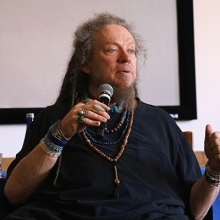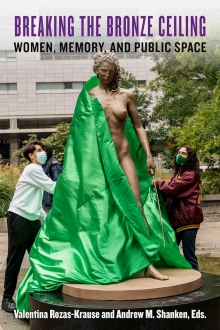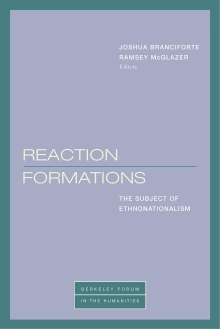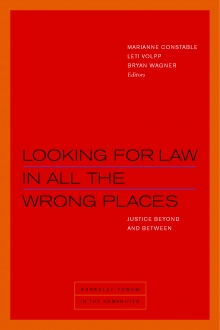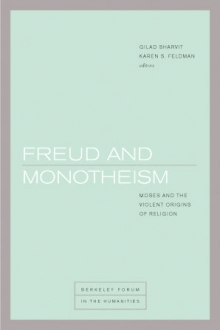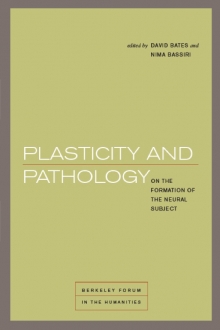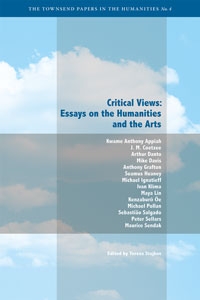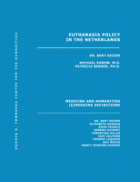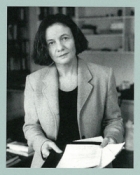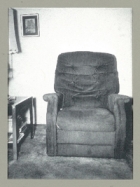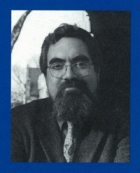The Townsend Center supports faculty and student research and scholarship through a variety of outlets.
Bear's-Eye View
Bear's-Eye View is a chronicle of students' engagement with the vibrant humanities culture at the Townsend Center and across the Berkeley campus. Each semester our undergraduate humanities writers soak up the wealth of humanities programs and events, and write about what they've learned.
Berkeley Forum in the Humanities
The Berkeley Forum in the Humanities, published by Fordham University Press, features topics of broad interest in the humanities and interpretive social sciences, with a focus on the work cultivated at the Townsend Center. The series presents work that is richly contextual along historical and social lines, while critical and challenging in its views.
Breaking the Bronze Ceiling uncovers a glaring omission in the global memorial landscape — the conspicuous absence of women. Exploring this neglected narrative, the book emerges as the foremost guide to women's memorialization across diverse cultures and ages. As global memorials come under intense examination, with metropolises vying for a more inclusive recognition of female contributions, this book stands at the forefront of contemporary discussion.
Many new right movements have in fact intensified or laid bare long-standing tendencies, but this volume seeks to address aspects of their cultural politics that raise new and urgent questions. How should we assess the new right’s disconcerting appropriations of strategies of minoritarian resistance? How can we practice critique in the face of adversaries who claim to practice a critique of their own? How do apparently post-normative versions of nationalism give rise to heightened forms of militarism, incarceration, censorship, and inequality?
For many inside and outside the legal academy, the right place to look for law is in constitutions, statutes, and judicial opinions. This book looks for law in the “wrong places” — sites and spaces in which no formal law appears. These may be geographic regions beyond the reach of law, everyday practices ungoverned or ungovernable by law, or works of art that have escaped law’s constraints.
Freud and Monotheism: Moses and the Violent Origins of Religion critically examines a range of discourses surrounding Freud’s Moses and Monotheism, taking as its entry point Freud’s relations to Judaism, his conception of tradition and history, his theory of the mind, and his model of transgenerational inheritance.
Plasticity and Pathology: On the Formation of the Neural Subject brings together diverse scholars interested in the historical and conceptual problems of life and particularly the life of human beings in the neural age.
This volume commemorates the twenty-fifth year of the Doreen B. Townsend Center for the Humanities and captures the breadth and depth of lectures and events presented by the center. Many are revised versions of lectures and presentations organized in connection with the annual appointment of the Avenali Professor in the Humanities or the Una’s Lecturer; several are based on other events presented by the center over the years, such as the “Humanities Perspectives on Aging” program or the “Futures” lecture series organized to commemorate the center’s tenth anniversary.
Occasional Papers
The Occasional Papers series makes available some of the many lectures and conversations of eminent scholars, writers, and artists who participated in Townsend Center programs 1994-2003.
In March 2004, in collaboration with the Center for Medicine, Humanities, and Law, the Townsend Center sponsored a week-long residency with Dutch physician and writer Bert Keizer. Dr. Keizer is particularly known for his book, Dancing with Mr. D., a personal account of his work with the terminally ill in an Amsterdam critical care facility.
Cannabis, Forgetting, and the Botany of Desire includes the proceedings of several events scheduled by the Townsend Center in celebration of Michael Pollan's residency as Avenali Lecturer for the 2002 Fall Semester. This Occasional Paper includes transcripts of the public lecture Pollan gave as well as the comments of a panel organized to explore the environmental impact of food production in general.
Migrations: The Work of Sebastião Salgado was one of several events scheduled by the Townsend Center in celebration of Sebastião Salgado's residency as Avenali Lecturer for academic year 2001–2002. Planned to complement the Berkeley Art Museum exhibit, Salgado’s lecture—reproduced here in a slightly edited form—was followed the next day by a panel of commentators whose remarks are also included in this Occasional Paper.
Eva Hoffman considers the current preoccupation with memory—as opposed to its referents (history, experience)—and particularly with memory of the Holocaust. She proposes that the intense absorption with memory has largely emerged from the “second generation,” i.e., from those for whom the Holocaust (or other disturbing pasts) has been a crucially formative event, yet one that they themselves did not experience.
Seeing the Difference brings together the texts of a two-day institute on death and dying, aimed at facilitating an interdisciplinary conversation between artists, humanists, and medical practitioners. The project proceeds from a doubled sense of “difference”: a view of death as separation or “difference,” and an acknowledgement that the various disciplines also view death “differently,” developing languages that are too often particular to their own fields.
Traditions of Conversion historicizes and texturizes Descartes’ conversion with a vibrant inquiry into early modern European conversion narratives. In the end, Grafton effectively troubles Descartes’ self-portrait as the embodiment of disembodied reason with an examination of Descartes’ autobiographical notes, which record that the foundations of his new philosophy lay not in reason but in a dream.
Representations
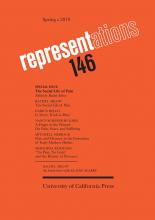
Representations is an interdisciplinary journal in the humanities and interpretive social sciences published quarterly by the University of California Press.




